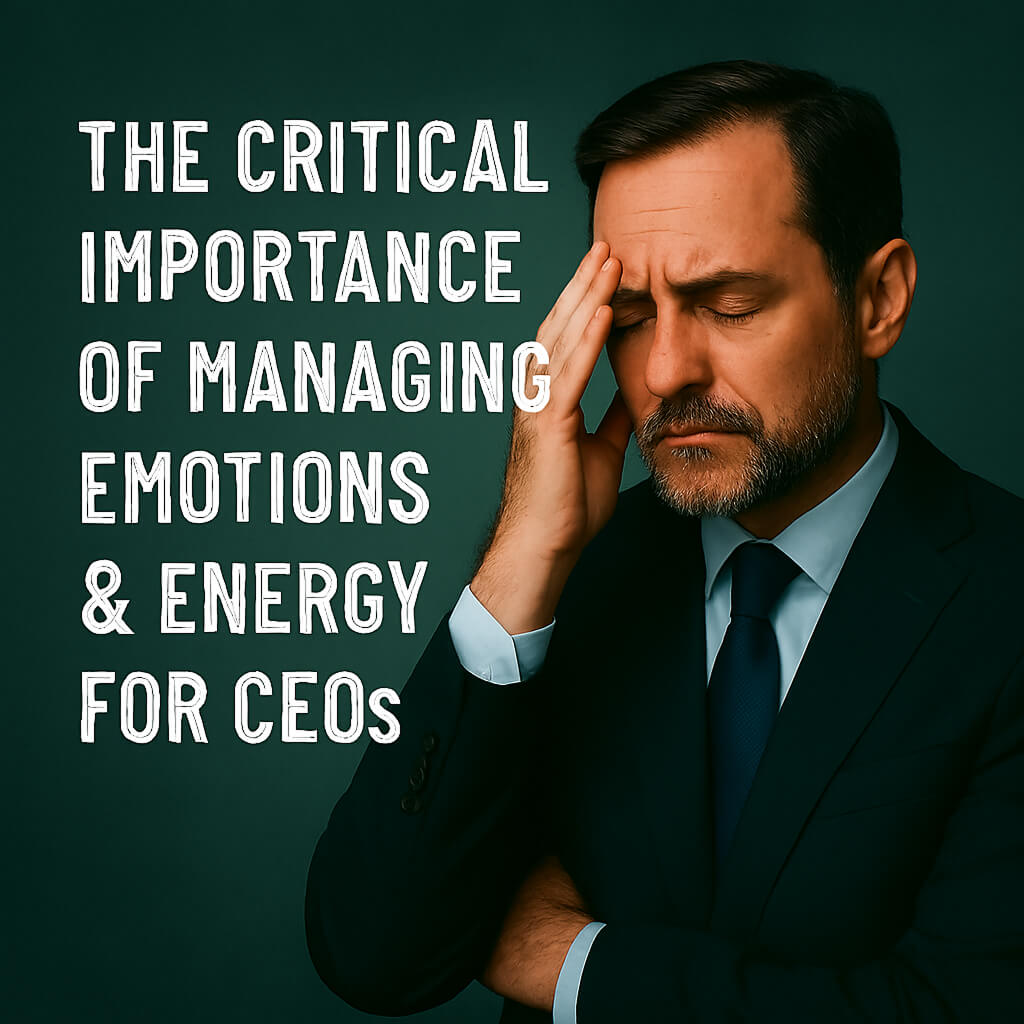As a CEO, the challenges you face are unlike any other in the organization. From driving growth in volatile markets to making high-stakes decisions, the demands on your time and attention are relentless.
Yet, what often gets overlooked amidst these pressures is how managing your emotions and energy can directly impact your effectiveness as a leader.
This isn’t just about personal wellness—it’s about how you show up every day, how you make decisions, and how you inspire those around you to perform at their best.
- Emotional Agility: The CEO’s Hidden Strength
Every decision a CEO makes has a ripple effect, not just on the organization but on the people who work within it.
Emotional agility is the ability to navigate the highs and lows, staying balanced in the face of uncertainty or stress.
CEOs often deal with intense pressure, and when emotions aren’t managed properly, they cloud judgment and affect the quality of decision-making.
Why it matters:
• Clarity of thought: Emotional regulation helps you maintain clarity in complex situations. Even with all the necessary data in front of you, if negative emotions or stress are unchecked, they can cloud your ability to process the information effectively, detaining you in decision-making.
• Resilience: It enables you to recover from setbacks quickly and maintain momentum.
• Influence: When you lead with emotional intelligence, you inspire confidence and trust within your team.
- Energy as a Leadership Resource
The energy you bring to your leadership role is just as crucial as your strategies or vision. Energy isn’t just physical – it’s emotional and mental.
How you manage it determines your stamina and ability to engage your team, especially during challenging times.
Why it matters:
• Sustaining momentum: CEOs often face long work hours and immense pressure, and maintaining high energy is essential to keep the organization moving forward.
• Inspiring others: Your energy sets the tone for the entire organization. When you bring focused, positive energy, it cascades down to your leadership team and beyond.
• Avoiding burnout: The ability to recharge—both mentally and physically—prevents burnout and allows you to consistently show up as your best self.
- Cultivating Self-Awareness
Managing your emotions and energy begins with self-awareness. Successful CEOs understand that how they manage themselves sets the tone for the entire organization.
Recognizing when you’re feeling overwhelmed or depleted is key to knowing when to step back, recharge, or change your approach.
Practical tips:
• Daily reflection: Take a few minutes each day to assess how you’re feeling emotionally and physically. This will help you stay tuned in to what’s draining or fueling your energy.
• Embrace mindfulness: Techniques like mindfulness or meditation can sharpen your emotional regulation and reduce stress.
• Set boundaries: Know when to say no and when to delegate tasks to avoid spreading yourself too thin.
- Leading with Empathy and Balance
Managing emotions doesn’t mean suppressing them – it’s about being aware of them and using them to your advantage.
Empathy, in particular, is crucial for CEOs, as it allows you to connect with your team on a deeper level.
When you show empathy, it fosters trust and openness, and in turn, your team feels supported and valued.
Balancing empathy with strategic decision-making ensures that your emotional intelligence complements your leadership.
This balance helps create a culture of loyalty, engagement, and innovation.
- Creating a Culture of Emotional Awareness
CEOs who model emotional regulation and energy management create a ripple effect throughout their organization.
When your team sees you balancing your own emotional well-being with the demands of leadership, they are more likely to do the same.
This fosters a healthier, more engaged workforce that can better handle the stresses of business.
The true measure of a CEO’s success isn’t just in the results delivered but in the way they lead, especially in times of stress and uncertainty.
Managing your emotions and energy isn’t a soft skill – it’s a leadership imperative.
When you lead with emotional intelligence and consistently manage your energy, you’re better equipped to make sound decisions, inspire your team, and sustain long-term success.

